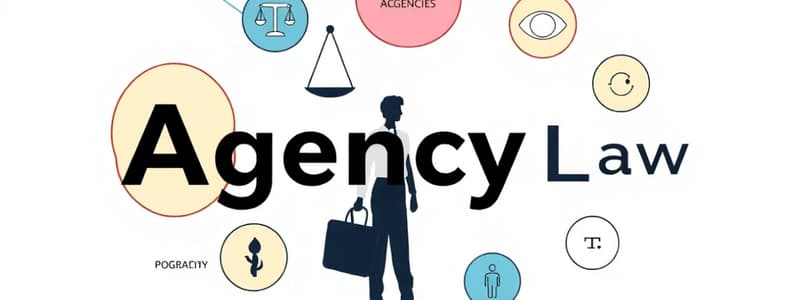Podcast
Questions and Answers
What defines the relationship between the principal and the agent in agency law?
What defines the relationship between the principal and the agent in agency law?
- The agent and principal must have a written contract.
- The agent automatically becomes a party to all contracts made.
- The agent has authority to act on behalf of the principal. (correct)
- The principal can act independently without the agent's consent.
Which of the following statements accurately describes the duties of an agent?
Which of the following statements accurately describes the duties of an agent?
- An agent cannot transfer property for the principal.
- An agent is prohibited from signing documents on behalf of the principal.
- An agent can only represent the principal in judicial matters.
- An agent can make and accept payments on behalf of the principal. (correct)
When does a legal relationship exist between the agent and the third party?
When does a legal relationship exist between the agent and the third party?
- When the principal is unable to communicate with the third party.
- Only when the agent is acting outside their authority.
- Only when something goes wrong. (correct)
- Always, irrespective of the circumstances.
In the scenario where an agent purchases a phone, what is the role of the retailer?
In the scenario where an agent purchases a phone, what is the role of the retailer?
If an agent exceeds their authority while acting on behalf of the principal, what is likely to happen?
If an agent exceeds their authority while acting on behalf of the principal, what is likely to happen?
What must exist for an agency relationship to be established?
What must exist for an agency relationship to be established?
What is NOT a type of agent defined in the agency content?
What is NOT a type of agent defined in the agency content?
Which statement about agents' capacity is accurate?
Which statement about agents' capacity is accurate?
What defines a Commercial Agent under the Commercial Agents Regulations?
What defines a Commercial Agent under the Commercial Agents Regulations?
Which scenario would EXCLUDE someone from being classified as a commercial agent?
Which scenario would EXCLUDE someone from being classified as a commercial agent?
Which type of principal hides the identity of the principal when engaging with third parties?
Which type of principal hides the identity of the principal when engaging with third parties?
What is true regarding the principal's capacity in an agency relationship?
What is true regarding the principal's capacity in an agency relationship?
What aspect of agency law has focused primarily on the protection of agents’ interests since the late 20th Century?
What aspect of agency law has focused primarily on the protection of agents’ interests since the late 20th Century?
What is primarily considered a secondary activity for an agent under commercial regulations?
What is primarily considered a secondary activity for an agent under commercial regulations?
In Scots law, how is the agent's role determined when compared to English law?
In Scots law, how is the agent's role determined when compared to English law?
Which of the following is a correct characteristic of an agent of necessity in English law?
Which of the following is a correct characteristic of an agent of necessity in English law?
What is one of the distinguishing features of forming express agency relationships?
What is one of the distinguishing features of forming express agency relationships?
Under the Commercial Agents (Council Directive) Regulations 1993, what must agents and principals provide to one another?
Under the Commercial Agents (Council Directive) Regulations 1993, what must agents and principals provide to one another?
Which activity would likely classify an agent's role as primary under the provided guidelines?
Which activity would likely classify an agent's role as primary under the provided guidelines?
What aspect does Lord Drummond Young emphasize regarding the interpretation of 'secondary' in agency roles?
What aspect does Lord Drummond Young emphasize regarding the interpretation of 'secondary' in agency roles?
Which is NOT a recognized method for establishing agency relationships?
Which is NOT a recognized method for establishing agency relationships?
How do regulatory indicators categorize an agent's purchase and sale activities?
How do regulatory indicators categorize an agent's purchase and sale activities?
What happens when an agent exceeds their authority and the principal does not ratify the action?
What happens when an agent exceeds their authority and the principal does not ratify the action?
Which type of authority is derived from the principal's actions that lead a third party to believe an agent has authority?
Which type of authority is derived from the principal's actions that lead a third party to believe an agent has authority?
What is one key difference between actual express and actual implied authority?
What is one key difference between actual express and actual implied authority?
Which scenario best illustrates an example of implied authority?
Which scenario best illustrates an example of implied authority?
In what situation can a principal be bound by the actions of an unauthorized agent?
In what situation can a principal be bound by the actions of an unauthorized agent?
Which of the following is NOT a characteristic of actual authority?
Which of the following is NOT a characteristic of actual authority?
Why might a principal invoke ratification regarding an agent's actions?
Why might a principal invoke ratification regarding an agent's actions?
Which case is associated with the concept of actual authority as a legal relationship between principal and agent?
Which case is associated with the concept of actual authority as a legal relationship between principal and agent?
What is the primary duty of an agent of necessity in relation to the principal?
What is the primary duty of an agent of necessity in relation to the principal?
Which of the following is NOT a requirement for an agent's actions to be considered necessary for the principal's benefit?
Which of the following is NOT a requirement for an agent's actions to be considered necessary for the principal's benefit?
In the doctrine of negotiorum gestio, under what circumstance is the gestor entitled to reimbursement?
In the doctrine of negotiorum gestio, under what circumstance is the gestor entitled to reimbursement?
What must occur for ratification to be valid?
What must occur for ratification to be valid?
Which of the following statements is true about ratification according to English law?
Which of the following statements is true about ratification according to English law?
What should a principal do to ensure they can make an informed decision regarding ratifying an agent’s action?
What should a principal do to ensure they can make an informed decision regarding ratifying an agent’s action?
Which case established that the agent's belief in the necessity of their actions is not a determining factor?
Which case established that the agent's belief in the necessity of their actions is not a determining factor?
In the case of an agent acting without authority, what must occur for the principal to be bound by the transaction?
In the case of an agent acting without authority, what must occur for the principal to be bound by the transaction?
What is a significant characteristic of the agent of necessity as defined in English law?
What is a significant characteristic of the agent of necessity as defined in English law?
How does the doctrine of negotiorum gestio differ from the agent of necessity in terms of intentions?
How does the doctrine of negotiorum gestio differ from the agent of necessity in terms of intentions?
Flashcards
Agency
Agency
A legal relationship where one person (agent) acts on behalf of another (principal) to create legal obligations.
Principal
Principal
The person who authorizes the agent to act on their behalf.
Agent
Agent
The person authorized to act on behalf of the principal.
Contract of Agency
Contract of Agency
Signup and view all the flashcards
Third Party
Third Party
Signup and view all the flashcards
Agent's Liability (exception)
Agent's Liability (exception)
Signup and view all the flashcards
Agent's Authority
Agent's Authority
Signup and view all the flashcards
Legal Effect of Agent's Acts
Legal Effect of Agent's Acts
Signup and view all the flashcards
Agent
Agent
Signup and view all the flashcards
Principal
Principal
Signup and view all the flashcards
Capacity
Capacity
Signup and view all the flashcards
Commercial Agent
Commercial Agent
Signup and view all the flashcards
Continuing Authority
Continuing Authority
Signup and view all the flashcards
Negotiate
Negotiate
Signup and view all the flashcards
Disclosed Principal
Disclosed Principal
Signup and view all the flashcards
Undisclosed Principal
Undisclosed Principal
Signup and view all the flashcards
Universal Agent
Universal Agent
Signup and view all the flashcards
General Agent
General Agent
Signup and view all the flashcards
Limited Agent/Ad Hoc Agent
Limited Agent/Ad Hoc Agent
Signup and view all the flashcards
Del Credere Agent
Del Credere Agent
Signup and view all the flashcards
Primary Activity (Agent)
Primary Activity (Agent)
Signup and view all the flashcards
Secondary Activity (Agent)
Secondary Activity (Agent)
Signup and view all the flashcards
English vs. Scots Law (Agency)
English vs. Scots Law (Agency)
Signup and view all the flashcards
Commercial Agent Regulations (Primary/Secondary)
Commercial Agent Regulations (Primary/Secondary)
Signup and view all the flashcards
Agent of Necessity
Agent of Necessity
Signup and view all the flashcards
Doctrine of Negotiorum Gestio
Doctrine of Negotiorum Gestio
Signup and view all the flashcards
Express Agency
Express Agency
Signup and view all the flashcards
Implied Agency
Implied Agency
Signup and view all the flashcards
Holding Out
Holding Out
Signup and view all the flashcards
Ratification
Ratification
Signup and view all the flashcards
Operation of Law
Operation of Law
Signup and view all the flashcards
Agent of Necessity
Agent of Necessity
Signup and view all the flashcards
Necessity Test (English Law)
Necessity Test (English Law)
Signup and view all the flashcards
Negatiorum Gestio (Scotland)
Negatiorum Gestio (Scotland)
Signup and view all the flashcards
Ratification
Ratification
Signup and view all the flashcards
Ratification Prejudices Third Parties
Ratification Prejudices Third Parties
Signup and view all the flashcards
Actual Authority
Actual Authority
Signup and view all the flashcards
Actual Express Authority
Actual Express Authority
Signup and view all the flashcards
Actual Implied Authority
Actual Implied Authority
Signup and view all the flashcards
Agent of Necessity
Agent of Necessity
Signup and view all the flashcards
Apparent/Ostensible Authority
Apparent/Ostensible Authority
Signup and view all the flashcards
Ratification
Ratification
Signup and view all the flashcards
Authority determines what an agent can and can't do
Authority determines what an agent can and can't do
Signup and view all the flashcards
Principal's Liability
Principal's Liability
Signup and view all the flashcards
Agent's Liability
Agent's Liability
Signup and view all the flashcards
Study Notes
Agency Explained
- Agency is a legal relationship where one person (the agent) acts on behalf of another (the principal) in transactions with third parties.
- The agent facilitates the legal relationship between the principal and the third party but is not a party to the contract unless something goes wrong.
- Principal’s legal obligations are attributed to the agent’s actions.
- Agents have various powers (contractual obligations, signing documents, legal actions, payment, etc.), dictated by the contract and/or authority granted.
- Agency is useful for practical reasons, expertise, geographical limitations, and corporate needs.
- Agency relationships are often formed through contracts; however, implicit, apparent, and other forms are also possible.
Types of Agents
- Universal agents: Unlimited authority to conduct any transaction for the principal.
- General agents: Broad authority for a range of activities.
- Limited/ad hoc agents: Authority for a specific task or limited set of transactions.
- Del credere agents: Guarantee the third party's solvency for the principal.
Types of Principals
- Disclosed principal: The agent reveals the principal's identity.
- Undisclosed principal: The agent does not disclose the principal's identity.
- Unidentified principal: The agent discloses they act as an agent but doesn't disclose the principal.
Legal Regulation of Agency
- Agency law combines common law principles and legislation (Commercial Agents Regulations for commercial agents).
- Regulations protect commercial agents, who are self-employed, have continuing authority to negotiate sales/purchases, and aren't excluded by the law.
- Continuing authority implies ongoing relationships, not one-off transactions, focusing on negotiation and contract conclusion.
- The Commercial Agents Regulations apply to ongoing activities in the UK, with some exceptions.
Determining "Commercial Agent" Status
- The Regulations define commercial agents.
- "Negotiate" is examined broadly (discussions about price and/or terms).
Determining Primary/Secondary Activities (Commercial Agent)
- English and Scottish courts differ in their interpretation of "secondary" activities.
- Scottish law considers the parties' initial intent.
- English law examines the agent's range of activities and compares them to non-agency ones.
Forming Agency Relationships
- Express agency: Explicitly appointed by the principal.
- Implied agency: Agency relationship implied by circumstances or actions of the parties.
- Holding out: Principal creates the appearance of agency.
- Agency of necessity: Safeguarding property/interests when contact with the principal is impossible. This is a form of implied authority where agent's act is deemed necessary to protect principal's interest
- Doctrine of Negotiorum Gestio (Scotland): Similar to agency of necessity
- Ratification: Retroactively approving an agent's unauthorized act.
- Operation of Law: Agency is created automatically by law (e.g., partners in a business).
Agency Authority (Actual & Apparent)
- Actual authority (express or implied): Agent has the authority the principal specifically grants or authority implied from circumstances, actions, or agency relationship
- Apparent authority: Principal's representation creates the appearance of authority to outsiders, meaning the agent isn't authorized but based on principal's actions appears that way. Third party reasonably believes agent has authority to act and can bind principal in contract.
- Breach of Warranty of Authority: Agent warrants they have authority which they do not possess, leading to personal liability towards the third party, if the acts was reasonable given the circumstances.
Key Differentiations & Liability
- Important to distinguish between types of authority (act and representation).
- An agent without authority can be liable for breach and the third party may have remedies.
- Principals are liable for the acts of their authorized agents and may become liable due to apparent authority if their actions make the third party believe that that the agent legally possesses the authority.
Studying That Suits You
Use AI to generate personalized quizzes and flashcards to suit your learning preferences.




